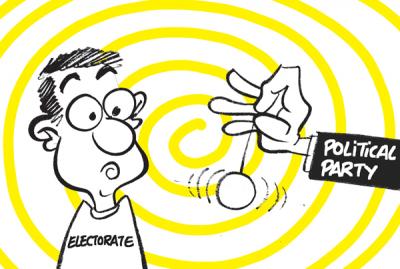In astronomy, the term “tidally-locked” applies to planets or other astronomical bodies such as the Moon which are said to be “tidally-locked” to another larger body when the gravitational gradient causes the same side of the smaller body to perpetually face the larger body. For example the same side of the Moon always faces the Earth. This concept allows us to draw an interesting analogy with the present state of Mauritian politics. For decades, the electorate has been “tidally-locked” to the same mainstream parties, facing and electing members of these same parties, without ever being able to break free from the latter’s “gravitational-pull” and drag new parties within the electoral system’s orbit. An investigation of the possible causes would be certainly enlightening.
If we factor-out cultural tendencies, the main causative factor is, ironically, a facet of democracy – the first-past-the-post election system, which is also referred to as the plurality voting system. In such a system, the winner of a seat is the candidate with the most votes. In political science, Duverger’s law is a principle which states that the plurality voting system fosters a two-party system, as a result of an alliance of weak parties or the elimination of weak parties by voters. In the latter case, voters gradually desert small parties on the grounds that they are perceived to have no chance of winning and that a vote for these parties is a wasted vote.
Another consequence of the first-past-the-post system is the concept of tactical-voting by the electorate. Voters feel they have an incentive to vote for one of the three candidates they predict are most likely to win in their constituency even if they would prefer other candidates to win, because a vote for any other candidate will in all likelihood be ‘wasted’ and have no impact on the final result. Since a few parties are perceived as credible politically, voters may well end up voting for candidates with whom they largely disagree so as to oppose a candidate with whom they disagree even more.
Examples abound from the recent elections of the above assertions. Despite demonstrating its prowess and legitimacy through its successful legal battle to enable its members to stand as candidates for general elections without having to state their ethnic belonging, the “Rezistans ek Alternativ” party was unable to ride the wave of discontent which hit the incumbent government and seems condemned under the plurality voting system to be at best a pressure group and at worst a political party marginalized by the electorate due to its perceived political weakness. Further, soon after the debacle for the Labour party, its representatives did not wait to brandish the argument of “vote sanction et non vote d’adhésion” to explain the large victory of the Alliance Lepep, which, if true, would be an example of tactical voting as encouraged under the first-past-the-post system.
In light of this analysis, we must pre-empt the evolution of the political scenery over the coming decades with the overarching intention to improve the system towards a truly representative democracy. If the first-past-the-post election is maintained, a two-party system will always prevail. The solution in this case is to open up those few big / mainstream parties to new blood as opposed to promoting a dynastic leadership. Opening up would be encouraged by way of limiting the prime ministerial mandate to two tenures for any individual and putting in place primaries within the mainstream parties to elect the candidate for prime-ministership. The only obstacle to these evolutionary steps is the lack of will on the part of today’s political ‘stars’ (that is mainstream parties) shining down the electorate. These political stars must recall that in astronomy it is well known that despite their mass and energy, stars eventually turn into dwarves before dying.
Politics : the “tidally-locked” state of the Mauritian electorate
- Publicité -
EN CONTINU ↻


